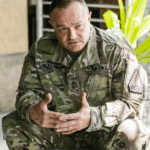Traumatic Brain Injury and Mental Health in Veterans

TBI in veterans may be higher than you realize. 414,000 American service members and veterans experienced a traumatic brain injury (TBI) between 2000 and 2019.1
TBI happens due to a sudden injury to the head that causes problems with normal brain function and produces a range of physical, cognitive, and emotional symptoms.
If you’re concerned about the mental health effects of TBI, a mental health professional can talk you through the best treatment options for your or a loved one’s needs. This page can also help, as it explores TBI in detail, including:
- What causes TBI in veterans
- TBI in veterans symptoms
- The long-term effects of TBI veterans
- The overlap between TBI and PTSD in veterans
- How the VA manages TBI in veterans
- Treatment traumatic brain injury and mental health in veterans
- Where to find professional support for TBI

What Causes TBI in Veterans?
Shockwaves from blast exposures- Falls during training exercises or while deployed
- Crashes involving Humvees, tanks, aircraft, or other military transport
- Direct blows to the head in hand-to-hand combat
- Being struck by or colliding with objects like equipment, doors, or debris
- Repetitive low-level blast exposure
Unfortunately, many veterans don’t even realize they’ve had a TBI until months or even years after the incident. For instance, they may struggle with memory, sleep, mood swings, headaches, or concentration, thinking it’s just stress or aging. However, all of these signals indicate that the brain has been injured.
What makes TBI worse in veterans is that it often overlaps with mental health struggles like post-traumatic stress disorder (PTSD), depression, and long-term pain.
TBI Symptoms in Military Veterans
In fact, symptoms are often brushed off as just “stress,” “getting older,” or “needing more rest.” But they’re not “just anything.” Often, these symptoms are persistent and frustrating. For example, one day, you might forget where you parked. Another day, you snap at someone you care about for no real reason.
Here are some symptoms veterans may experience after a TBI. Not everyone has all of them, and they may appear gradually or flare up over time:2
Trouble focusing or remembering recent information- Frequently repeating things without realizing it
- Becoming quick to anger or easily frustrated over small things
- Frequent headaches
- Feeling lightheaded or unsteady
- Changes in how things taste and smell
- Blurry, distorted vision
- Problems with hearing or sensitivity to sound
- Struggling to find the right words or speak clearly
Long-Term Effects of TBI in Veterans
To understand this effect better, let’s first talk about a concept called “neurovascular coupling.” Neurovascular coupling is the brain’s ability to match blood flow to areas that are actively working.
In a healthy brain, when a specific region starts to process thoughts, emotions, or sensory input, it automatically gets more oxygen and nutrients through increased blood flow.
TBI impairs this normal flow of blood into high-functioning brain regions.3 Over time, this mismatch leads to reduced brain function and what many veterans experience as “brain fog.” This disruption explains why cognitive deficits, such as memory lapses, slowed thinking, poor attention, and trouble planning, persist long after an injury.
Another long-term consequence of TBI is the increased risk of PTSD. TBI and PTSD often co-occur, and they also reinforce each other. For example, a brain already struggling to regulate blood flow and process emotional stimuli becomes more reactive to trauma reminders.
A brain injury can also alter pain processing, causing long-term pain. This is particularly problematic for veterans who sustained other injuries during the same events that caused their head injury.
Additionally, TBI’s cognitive and emotional impairments can interfere with job performance and result in the loss of jobs. The psychological toll of injury also causes a deep, lingering sense of sadness and disinterest in life. And these struggles can lead to suicidal thoughts or behaviors. Research shows that veterans with a history of TBI are at significantly higher risk of suicide than those without it.4
The Overlap Between TBI and PTSD in Veterans
TBI and PTSD share a lot of symptoms.5 And in mild cases, it’s hard to tell where one ends and the other begins. For example, common symptoms found in both conditions include:
Trouble sleeping- Feeling anxious or easily irritated
- Difficulty concentrating
- Memory issues
- Negative thoughts or mood changes
The bright side, however, is that both PTSD and TBI are treatable. Some of the most effective treatments for PTSD, like cognitive processing therapy (CPT) and prolonged exposure (PE), are proven to work even if you’ve had a TBI.6 In fact, these therapies also improve some TBI-related symptoms, such as concentration and mood.
VA Disability Rating for Traumatic Brain Injury
The VA evaluates your claim for a TBI using Diagnostic Code 8045 under 38 CFR § 4.124a.8 This looks at the impact of the TBI on ten specific brain functions, called “facets.”8
These include:
1. Memory, attention, concentration, and executive functioning:
These are the core skills that help you stay organized, solve problems, set goals, and adapt when things don’t go as planned.
2. Judgment:
This includes the ability to make safe, reasonable decisions. During testing, the VA asks you to weigh your options, understand the possible outcomes, and make choices that reflect your best interest.
3. Social interaction:
This measures how well you’re able to relate to others. For instance, if you find yourself acting inappropriately in social situations or feeling out of place even around familiar people, it may be related to your TBI.
4. Orientation:
Assessing whether you know who you are, where you are, what time it is, and what’s happening around you. The VA notices how often disorientation occurs and how it impacts your daily awareness.
5. Motor activity (with intact strength and sensation):
Even if your muscles work normally, brain injury can make it hard to initiate or control movements. The VA looks at whether your physical responses are slowed or disconnected from intent.
6. Visual-spatial orientation:
This is how well you can make sense of your environment. If you’ve experienced getting lost in familiar places or struggle to follow directions, it may be a sign of visual-spatial disorientation.
7. Subjective symptoms:
These are symptoms that may not show up on tests but are very real in your day-to-day life. Examples include persistent headaches, fatigue, depression, or anxiety.
8. Neurobehavioral effects:
These effects include emotional and behavioral changes like increased irritability, acting without thinking, verbal outbursts, or difficulty recognizing that anything is wrong.
9. Communication difficulties:
The VA takes into account if you are struggling to speak, write, understand language, or follow conversations.
10. Level of consciousness: difficulties:
This assesses whether a veteran is fully conscious, in a reduced state of awareness, or living in a coma or vegetative state.
Each of these functions gets rated individually based on the level of impairment, which ranges from zero to total:
- 0 = No impairment (0% rating)
- 1 = Mild impairment (10%)
- 2 = Moderate impairment (40%)
- 3 = Severe impairment (70%)
- Total = Total impairment (100%)
The VA then uses these scores to determine your overall disability rating.
Special Monthly Compensation for Severe TBI
When a TBI leaves a veteran with life-altering limitations, they can apply for Special Monthly Compensation (SMC).
SMC is extra monthly compensation given on top of your standard VA disability benefits. It’s awarded when the injury results in conditions that go above and beyond what the regular rating schedule can account for. Examples include needing help with daily tasks, losing the use of limbs or senses, or being housebound.
Depending on how the injury has impacted your life, the VA may assign:
- SMC (t): One of the most advanced levels of compensation, assigned to veterans with severe TBI who require regular aid and attendance. They have cognitive impairments that demand constant supervision to avoid harm to self or others.
- SMC (r-1) or (r-2): Assigned when the veteran needs constant aid and attendance, sometimes including skilled medical care at home.
The VA understands that the toll of severe TBI is profound on those affected and their caregivers. SMC is a way to honor your struggle and help you cover the cost of in-home care, equipment, and daily support. It also offers families room to breathe financially.
Treatment for Mental Health Effects of TBI in Veterans
The treatment of the mental health effects of TBI is multi-disciplinary, meaning it pulls in professionals from different areas of specialism. The aspects of treatment include:
Pharmacological Interventions
Commonly prescribed medications for mental health symptoms in veterans include:
- Antidepressants like sertraline or venlafaxine
- Mood stabilizers (like lamotrigine or valproate) to manage irritability, agitation, or emotional dysregulation
- Sleep aids to treat insomnia or trauma-related nightmares
- Stimulants or wakefulness-promoting agents for significant cognitive fatigue9
Providers start low and go slow on medications. You will likely begin with a small dose while your body’s response to the drug is monitored. If you respond well, your dose may be increased.
Cognitive Rehabilitation for TBI
The Cognitive Symptom Management and Rehabilitation Therapy (CogSMART) is widely used within the VA system for:10
Teaching veterans compensatory strategies, like using planners, phone alarms, or visual reminders- Practicing mental flexibility and decision-making through real-life scenarios
- Breaking down tasks to reduce mental overload
- Improving self-awareness and self-monitoring
- Teaching veterans how to conserve mental energy and pace themselves
Rehabilitation is delivered by neuropsychologists, occupational therapists, or speech-language pathologists.
Psychological Support
Cognitive behavioral therapy is one of the most widely used and well-supported treatments for trauma-related mental health challenges. CBT helps veterans identify and change patterns of thinking and behavior that contribute to emotional distress.
Cognitive processing therapy is a specialized form of CBT that works best for PTSD. Veterans struggle with painful beliefs about themselves or the world that stem from their trauma, and CPT is used to challenge these beliefs.
Prolonged exposure therapy is another evidence-based treatment for PTSD. It involves repeated, guided exposure to trauma-related thoughts and situations that have been avoided due to fear or distress. Over time, the exposure reduces the power of these memories and restores a sense of control.6
Get Compassionate Trauma Treatment at Mission Connection
Living with the mental health effects of TBI can be overwhelming. At Mission Connection Healthcare, we understand the complex relationship between trauma and mental health.
We offer personalized, evidence-based trauma treatments such as eye movement desensitization and reprocessing (EMDR) and trauma-focused CBT, through our online services.
Our team provides clinical care, compassionate education, emotional support, and practical tools to help you reclaim your control. Contact us today so we can help you break the walls you’ve built around yourself due to your trauma.

References
- Center for Excellence in Disabilities. (n.d.). Traumatic brain injury and soldiers. TBI.CEDWVU.org. Retrieved June 10, 2025, from https://tbi.cedwvu.org/veterans-resource-manual/traumatic-brain-injury-and-soldiers/
- U.S. Department of Veterans Affairs. (2019). Traumatic brain injury (TBI). https://www.research.va.gov/topics/tbi.cfm
- Jang, H., Huang, S., Hammer, D. X., Wang, L., Rafi, H., Ye, M., Welle, C. G., & Jonathan. (2017). Alterations in neurovascular coupling following acute traumatic brain injury. Neurophotonics, 4(4), 045007. https://doi.org/10.1117/1.nph.4.4.045007
- Massaad, E., & Kiapour, A. (2024). Long-term health outcomes of traumatic brain injury in veterans. JAMA Network Open, 7(2), e2354546. https://doi.org/10.1001/jamanetworkopen.2023.54546
- U.S. Department of Veterans Affairs. (2014). TBI and PTSD. https://www.ptsd.va.gov/understand/related/tbi_ptsd.asp
- Held, P., Klassen, B. J., Brennan, M. B., & Zalta, A. K. (2018). Using prolonged exposure and cognitive processing therapy to treat veterans with moral injury-based PTSD: Two case examples. Cognitive and Behavioral Practice, 25(3), 377–390. https://doi.org/10.1016/j.cbpra.2017.09.003
- Legal Information Institute. (2025). 38 CFR § 4.124a – Neurological conditions and convulsive disorders. https://www.law.cornell.edu/cfr/text/38/4.124a
- U.S. Department of Veterans Affairs. (n.d.). Traumatic brain injury (TBI) examination comprehensive version. Retrieved June 10, 2025, from https://benefits.va.gov/PREDISCHARGE/DOCS/disexm58.pdf
- Tani, J., Wen, Y.-T., Hu, C.-J., & Sung, J.-Y. (2022). Current and potential pharmacologic therapies for traumatic brain injury. Pharmaceuticals, 15(7), 838. https://doi.org/10.3390/ph15070838
- Twamley, E. W., Jak, A. J., Delis, D. C., Bondi, M. W., & Lohr, J. B. (2014). Cognitive Symptom Management and Rehabilitation Therapy (CogSMART) for veterans with traumatic brain injury: Pilot randomized controlled trial. Journal of Rehabilitation Research and Development, 51(1), 59–70. https://doi.org/10.1682/jrrd.2013.01.0020






